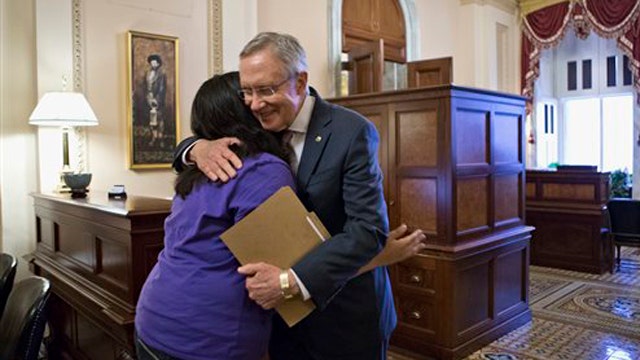How will immigration reform change the American dream?
Bill will change the ethnic landscape of the nation
Attention is shifting to the Republican-led House after the Senate approved a sweeping immigration overhaul that would extend legal status to millions of undocumented immigrants while increasing border security.
The Senate on Thursday voted 68-32 to approve the bill, following a series of test votes that already demonstrated the legislation had enough support to pass.
The question now is whether the Senate vote can compel the Republican-led House to follow suit. Though 68 votes is a strong majority, backers fell short of the 70 votes they were hoping to secure, a number they felt would help persuade House leaders to move forward. Some Republicans have already declared the Senate bill "dead on arrival" in the House, but House lawmakers are nevertheless working on their own piecemeal version of immigration legislation.
House Speaker John Boehner, who says both chambers should act on immigration, declined to say Thursday how his caucus would proceed.
"We're going to go home for the recess next week and listen to our constituents," he said. "And when we get back, we're going to ... have a discussion about the way forward."
Despite the strong majority in favor of the bill on Thursday, Congress remains divided over the issue.
Republican opponents of the bill voiced frustration as the Senate scrambled to finalize its work ahead of the looming recess. Sen. Charles Grassley, R-Iowa, on Wednesday said he felt "used and abused," as he tried to slow down the process and call for more amendments to be considered.
All Democrats, in addition to 14 Republicans, voted for the legislation on Thursday. All "no" votes came from the Republican side of the aisle.
Sen. Jeff Sessions, R-Ala., an ardent critic of the legislation, said the failure to reach 70 votes "ensures the House has plenty of space to chart an opposite course and reject this fatally flawed proposal."
Sessions complains that, among other issues, the bill would lead to a "surge" in legal immigration that would "reduce wages and increase unemployment."
The legislation would be the most sweeping overhaul of America's immigration system since the 1980s. It would legalize millions of presently illegal immigrants, while expanding legal immigration and increasing border security.
"The vast majority of members in this body realize that the immigration system is broken and needs fixing," Sen. Chuck Schumer, D-N.Y., said on the Senate floor Wednesday.
But many in the GOP-controlled House oppose the pathway to citizenship at the center of the Senate bill. And many prefer a piecemeal approach rather than a sweeping bill like the one the Senate is producing.
Republicans in both chambers have complained that a late-developing compromise measure that increased spending on border security still puts "amnesty" ahead of security.
Thursday's vote capped weeks of bipartisan negotiations and hands President Obama, who has made immigration legislation the cornerstone of his second-term agenda, a partial victory.
"The United States Senate delivered for the American people, bringing us a critical step closer to fixing our broken immigration system once and for all," President Obama said in a statement. He added: "Today, the Senate did its job. It's now up to the House to do the same."
At its core, the legislation in the Senate includes numerous steps to prevent future illegal immigration, while at the same time it offers a chance at citizenship to the 11 million immigrants now living in the country unlawfully.
It provides for 20,000 new Border Patrol agents, requires the completion of 700 miles of fencing and requires an array of high-tech devices to be deployed to secure the border with Mexico.
Businesses would be required to check on the legal status of prospective employees. Other provisions would expand the number of visas for highly skilled workers relied upon by the technology industry. A separate program would be established for lower-skilled workers, and farm workers would be admitted under a temporary program.
The basic legislation was drafted by four Democrats and four Republicans who met privately for months to produce a rare bipartisan compromise in a polarized Senate. They fended off unwanted changes in the Senate Judiciary Committee and then were involved in negotiations with Republican Sens. John Hoeven of North Dakota and Bob Corker of Tennessee on a package of tougher border security provisions that swelled support among Republicans.
Outnumbered critics insist the bill falls short of the promises made for it.
Sen. Richard Shelby, R-Ala., called it "the mother of all amnesties."
The House Judiciary Committee is in the midst of a piece-by-piece effort, signing off Wednesday on legislation to establish a system requiring all employers within two years to check their workers' legal status.
The Judiciary Committee was turning its attention Thursday to a bill on high-skilled workers. Last week it approved two more measures, one on agriculture workers and a second to make illegal presence in the country a federal crime, instead of a civil offense as it is now.
The Associated Press contributed to this report.













































